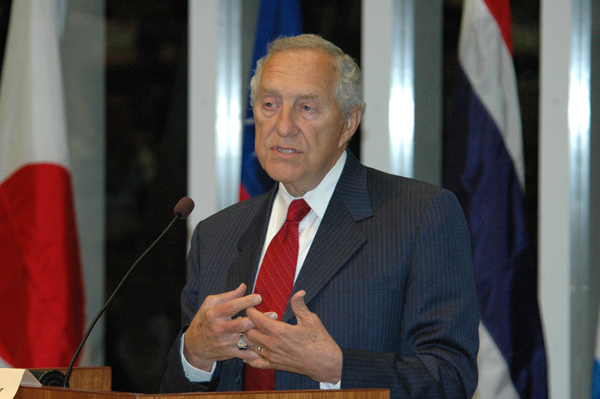I was shocked to learn from my former student, Kayla Oliver LAW ’18, now an editor of the Yale Law Journal, that Yale invited President Paul Kagame of Rwanda, the most murderous dictator in all Africa, to speak about democracy. That was a colossal mistake.
During my first weeks serving as U.S. Ambassador to Burundi, the twin-country neighbor of Rwanda, I joined the U.S. Ambassador to Rwanda to meet then-Col. Paul Kagame. He was dressed in camouflage uniform and stood in a shattered warehouse amid the rubble in the capital city, Kigali. Open warfare in the most disastrous genocide in decades had ended only a few weeks before. But revenge had not.
I told Kagame that the UN Refugee Camp, four miles inside the Burundi-Rwanda border, was still receiving 1,000 new Rwandan refugees daily. In my visit to the camp — which housed almost 100,000 — I interviewed camp refugees, asking when they would return to their home country. Their reply was always the same: “When Kagame’s forces stop killing us.”
Kagame’s response to me was insufficient. He told me that occasionally some of his troops might engage in personal retribution, but that revenge was not his policy. This was not the case: genocidal killing and intimidation have, in fact, been his consistent policy for all his 22 years in power.
Human Rights Watch, among others, has documented some his continuing civil rights violations. The United Kingdom, Spain and several European nations no longer grant this head of state entry into their countries.
My wife’s and my book “From Bloodshed to Hope in Burundi,” endorsed by Presidents Jimmy Carter and Bill Clinton and by Paul Rusesabagina, the hero of “Hotel Rwanda” and a U.S. Medal of Freedom recipient, has a chapter on Kagame and the consequences of his murderous actions on Burundi.
Why has the USA not censured Kagame?
Probably because Kagame himself and some of his troops were trained at a US military base in Ft. Leavenworth, Kansas, in the 1990s. The Pentagon has held banquets honoring this horrific dictator.
Several years ago I phoned a Danish missionary, Knut Hansen, who had lived 32 years along the Rwandan border in ministering, educating and caring for the people of Burundi and Rwanda. When asked for his current assessment of Kagame, he replied “Bob, Kagame is the worst dictator in all of Africa; there is blood all over his hands.”
It is well-known and widely published that Kagame’s secret police murdered on the streets in South Africa a former member of Kagame’s administration who had abandoned Kagame and gone into hiding. This killing is well documented and legendary.
He claims to now have democratic elections with numerous political parties having names on the ballot. But Kagame’s people count the votes and give him over 90 percent of those cast. Citizens, knowing they have no secret ballot, either do not vote, or for their own safety, cast their votes for Kagame. It is as if Hitler or Stalin were holding the elections. These elections are not secret or trust worthy; the populous votes as Kagame wants for fear of retribution.
Yet Yale has honored him. Those at Yale who invited Kagame should remember the famous admonition of a 19th-century head of Magdalene College, Oxford: “You will find it a good idea, sir, always to verify your references.”
Senator Robert Krueger is a former US Ambassador to Burundi, US Ambassador-at-Large to Mexico, US Ambassador to Botswana, US Congressman (D.-Texas), US Senator (D.-Texas), US Special Representative to the Southern African Development Community, retired. Currently, professor in the Practice, Political Science Department, Texas Tech University
Source: THE YALE DAILY NEWS
































































